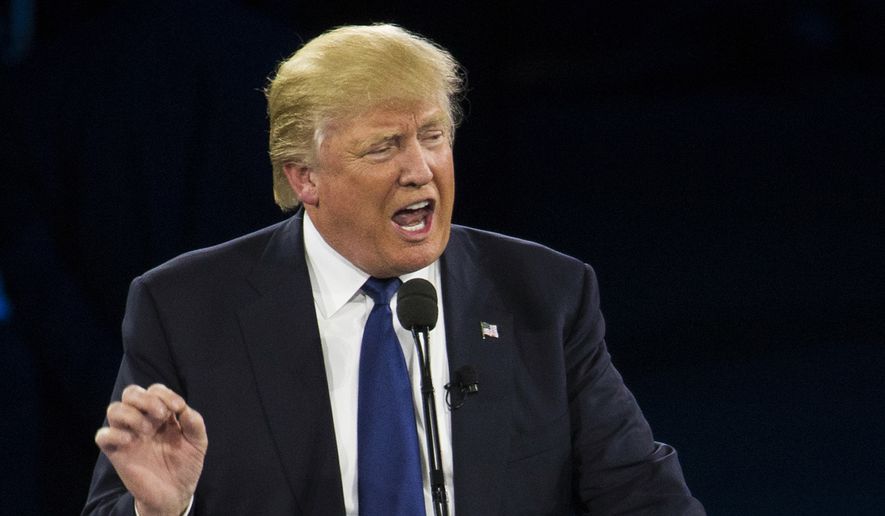The president of Emory University said the school would review security-tape footage and potentially discipline students found to have written the name of Republican primary front-runner Donald Trump in chalk across the campus.
President James W. Wagner said the university’s Freedom of Expression Committee is meeting to determine whether the name of one of the presidential front-runners in the two major parties makes other students feel unsafe and is thus punishable under Emory’s student conduct policy.
“Was it really just a message about a political preference, a candidate preference, or was it a harsher message?” Mr. Wagner told the Emory Wheel, the university’s student newspaper. “Those who met with me were genuine in their concerns that it was the latter.”
Regardless, the university already has issued an official condemnation in its own name.
After anonymous chalkings supporting Mr. Trump began appearing like specters throughout the Atlanta campus, students petitioned the administration demanding that they denounce the chalkings, saying the knowledge that people might support Mr. Trump was a threat to them.
Roughly 40 students carrying signs such as “Stop Trump” and “Stop Hate” protested outside of the Administrative Building this week, chanting “You are not listening! Come speak with us, we are in pain!”
SEE ALSO: Student senate at UC Berkeley calls for on-campus abortion clinic
“I’m supposed to feel comfortable and safe,” one unidentified student told the Wheel. “But this man is being supported by students on our campus, and our administration shows that they, by their silence, support it as well … I don’t deserve to feel afraid at my school.”
Emory junior Harpreet Singh said he thought the pro-Trump chalkings were just a joke at first.
“I saw a big one, ’Trump 2016,’ so I thought it was just an isolated incident and I didn’t think much of it,” Mr. Harpreet told the Wheel. “I thought, ’Okay, it’s just a guy who wants to write whatever he wants to believe in for his political campaign.’ I was like, ’Okay, I’m fine with that, to a certain extent.’”
But after seeing another chalk message reading “Trump 2016” and then another proclaiming “Accept the Inevitable: Trump 2016,” he said free speech had gone too far.
It was “a bit alarming,” he said. “What exactly is the inevitable? Why does it have to be accepted?”
After the student protesters made their way to an administrative board room, Mr. Wagner was called in to listen to their complaints, which included comparing the name “Trump” to Nazi symbology.
SEE ALSO: Pope Francis speaks out against ‘blind violence’ in Brussels bombing
“Why did the swastikas receive a quick response while these chalkings did not?” one student asked Mr. Wagner, referring to an event where the Nazi symbol had been drawn on a Jewish fraternity house.
“What do we have to do for you to listen to us?” students asked Mr. Wagner directly, to which he responded, “What actions should I take?”
One student suggested Mr. Wagner should “decry the support for this fascist, racist candidate,” to which he responded, “No, we will not.”
But later that evening, the Emory administration issued an official response condemning the pro-Trump chalkings as representing “values regarding diversity and respect that clash with Emory’s own.”
In the campuswide email, Mr. Wagner promised to implement “immediate refinements to certain policy and procedural deficiencies, regular and structured opportunities for difficult dialogues, a formal process to institutionalize identification, review and addressing of social justice opportunities and issues and a commitment to an annual retreat to renew our efforts.”
He also promised protesters that any students found to have written Mr. Trump’s name, despite its ubiquitous use in the news and social media, would go through the student conduct violation process.
But not everyone agrees with the president’s decision to investigate for Trump supporters. The editor of the Emory Wheel on Wednesday penned an editorial that denounced Mr. Trump as an “offensive man,” but encouraged students to engage with his ideas, rather than try to sweep him under the rug.
“Institutionally prohibiting an ignorant, hurtful or violent idea does not destroy it; it allows the idea to grow and worsen in the shadows, far from the moderating effects of public scrutiny,” junior Zak Hudak wrote. “The best way to destroy an idea is to confront it.”
Mr. Hudak continued that, if students refuse to confront difficult topics, then “we lose our purpose as a university.”
• Bradford Richardson can be reached at brichardson@washingtontimes.com.




Please read our comment policy before commenting.